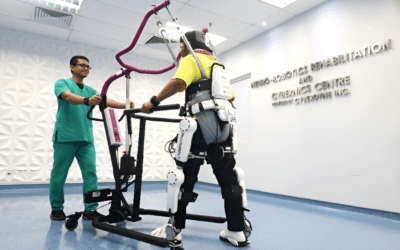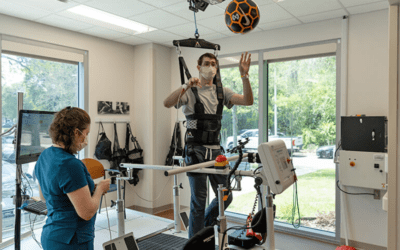What is MND – Motor Neuron Disease?
Motor Neurone Disease (MND) is a group of progressive neurological disorders that affect the motor neurons, the nerve cells responsible for controlling voluntary muscle movements. The disease leads to the gradual degeneration and death of these motor neurons, resulting in muscle weakness, atrophy, and loss of motor function. Symptoms typically include muscle weakness, difficulty speaking, swallowing, and breathing, and the condition can lead to severe disability and eventually death. The most common form of MND is Amyotrophic Lateral Sclerosis (ALS). MND is a progressive condition with no known cure, and treatment focuses on managing symptoms and improving quality of life.
Causes for Motor Neuron Disease
The exact causes of Motor Neurone Disease (MND) are not fully understood, but several factors are believed to contribute:
- Genetic Factors: Sometimes, MND can be inherited due to genetic mutations. Familial forms of MND, such as Amyotrophic Lateral Sclerosis (ALS), are linked to specific genetic mutations.
- Environmental Factors: Exposure to certain environmental toxins, chemicals, or heavy metals may increase the risk, though specific environmental triggers are not clearlstry defined.
- Oxidative Stress: Damage caused by oxidative stress, where harmful free radicals damage nerve cells, may contribute to the development of MND.
- Inflammation: Chronic inflammation in the nervous system might play a role in the progression of MND.
- Abnormal Protein Aggregation: The accumulation of misfolded proteins in motor neurons is observed in MND, suggesting a link to cellular dysfunction.
- Autoimmune Factors: Sometimes, the body’s immune system may mistakenly attack motor neurons, though this is less well understood.
Despite these potential factors, MND is likely caused by a combination of genetic, environmental, and biological influences, and the exact mechanisms remain an area of ongoing research.

Symptoms for Motor Neuron Disease
Symptoms of Motor Neurone Disease (MND) can vary depending on the specific type and progression of the disease but generally include:
- Muscle Weakness: Progressive weakness in muscles, affecting the limbs and trunk, leading to difficulties with movement and daily activities.
- Muscle Atrophy: Wasting of muscles due to the loss of motor neurons.
- Difficulty Speaking: Slurred or slow speech, which can progress to difficulty in articulating words.
- Swallowing Difficulties: Problems with swallowing (dysphagia) and chewing, leading to choking or aspiration.
- Breathing Problems: Weakening of respiratory muscles, causing shortness of breath and difficulty with breathing.
- Twitching and Cramps: Muscle twitching (Fasciculations) and cramping in affected areas.
- Loss of Fine Motor Skills: Difficulty with tasks requiring precise hand movements, such as writing or buttoning clothes.
- Emotional and Cognitive Changes: Some individuals may experience changes in mood, behavior, or cognitive function, although this is less common.
These symptoms usually worsen over time, leading to increasing disability and, ultimately, significant impairment in daily functioning.
Complications of Motor Neuron Disease
Motor Neurone Disease can lead to various complications as it progresses, affecting multiple body systems. Key complications include:
- Respiratory Failure: Weakening of the respiratory muscles can lead to breathing difficulties, reduced lung capacity, and eventually respiratory failure, which is often the primary cause of death in MND.
- Difficulty Swallowing (Dysphagia): As the muscles controlling swallowing weaken, patients may experience choking, malnutrition, dehydration, and aspiration pneumonia.
- Speech Problems: Progressive muscle weakness affects speech, leading to slurred or unintelligible speech, making communication difficult.
- Mobility Issues: Muscle weakness and atrophy lead to loss of mobility, requiring wheelchairs or assistive devices, and increasing the risk of falls and injuries.
- Cognitive and Emotional Changes: Some individuals may develop frontotemporal dementia (FTD), which causes changes in personality, behavior, and cognitive function. Emotional changes like depression and anxiety are also common.
- Muscle Stiffness and Pain: As muscles weaken, stiffness, cramps, and joint pain can develop, causing discomfort and limiting movement.
These complications significantly impact the quality of life, and managing them often requires multidisciplinary care.
Can Motor Neuron Disease be prevented?
Currently, there is no known way to prevent Motor Neurone Disease (MND), as its exact causes are still unclear. However, some general strategies that may reduce the risk or support overall neurological health include:
- Avoiding Environmental Toxins: Limiting exposure to chemicals, heavy metals, or pesticides that have been associated with an increased risk of neurological disorders may help.
- Healthy Lifestyle: Maintaining a healthy diet, regular exercise, and good overall health can support brain and nerve function.
- Genetic Counseling: For individuals with a family history of MND, genetic counseling may provide insights into the risk and options for managing that risk.
- Reducing Oxidative Stress: Antioxidant-rich foods and a balanced lifestyle may help reduce oxidative stress, which is believed to play a role in neurodegenerative diseases.
Despite these steps, there is no guaranteed way to prevent MND, and research is ongoing to better understand the disease and its potential triggers.

Treatment for MND – Motor Neuron Disease
While there is no cure for Motor Neurone Disease (MND), treatment focuses on managing symptoms, slowing disease progression, and improving quality of life. Key approaches include:
- Medications:
- Riluzole: The only approved drug to slow the progression of MND by reducing nerve damage.Edaravone: Another medication that may help slow functional decline in some cases of ALS (a type of MND).
- Symptom management drugs: Medications for muscle cramps, spasticity, pain, and saliva control.
- Respiratory Support:
- Non-invasive ventilation (NIV): Helps with breathing difficulties, especially at night.
- In severe cases, invasive ventilation may be required.
- Physical Therapy:
- Aims to maintain muscle strength and mobility, reduce stiffness, and manage joint pain.
- Speech and Swallowing Therapy:
- Speech therapy helps with communication difficulties.
- Dietary modifications and techniques to manage swallowing problems (dysphagia) are essential.
- Occupational Therapy:
- Assists with adapting to the environment and using assistive devices to maintain independence in daily tasks.
- Nutritional Support:
- Specialized diets and feeding tubes may be used to prevent malnutrition and dehydration as swallowing becomes difficult.
- Psychological and Emotional Support:
- Counseling and support groups help patients and families cope with emotional and mental health challenges.
Although there is no cure for Motor Neurone Disease (MND), treatments focus on managing symptoms and improving quality of life. Early intervention and multidisciplinary care involving neurologists, therapists, and specialists are essential for slowing progression and enhancing patient well-being.



